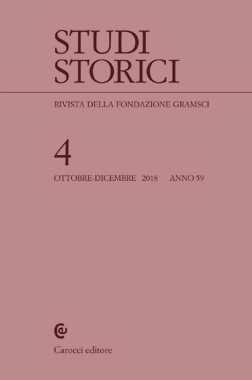
luglio - settembre 2011 anno 52
Sommario e abstract degli articoli
Ottavia Niccoli, Koinonia, pp. 523-576
Note sulle vicende di un gruppo di giovani «spirituali» italiani negli anni Venti del Novecento
Some notes on a group of young Italian «spirituali» during the 1920s
Following a brief discussion of the key figure of Ernesto Buonaiuti (1881-1946) within early twentieth-century «modernism», this article deals with the network of Buonaiuti’s friends and students who played a crucial role in putting together a spiritual community, called koinonia. Through a close examination of an unpublished collection of letters between Agostino Biamonti (1897-1924), Raffaello Niccoli (1897-1977) and Mario Niccoli (1904-1964), the author is able to trace aims, projects and books circulating among the members of this spiritual community, and to prove how a variety of cultural and religious identities could combine within the koinonia.
Francesco Barbagallo, pp. 577-586
Giustino Fortunato, l’Unità italiana e il Mezzogiorno
Giustino Fortunato, Italian Unity and Southern Italy
This article reconstructs Giustino Fortunato’s cultural and political iter, his interest in the problems of Italy’s Mezzogiorno, and his part in the cultural current of «meridionalismo». Fortunato spoke of the problem of «two Italies» and «two civilizations», and his critique was directed towards the ruling class in southern Italy, and in Naples in particular. In his articles La città e la plebe and La camorra (1878-79), Fortunato analyzed the tragic conditions of the popular masses in Naples, and the link that existed between this social context, the growth of criminal organizations, and the responsibilities of the ruling classes. A member of the Italian Parliament starting in 1880, Fortunato took increasingly liberalist positions. His encounter with Gaetano Salvemini and his contributions to the new review L’Unità marked the final important moments in a very interesting cultural and political iter.
Alessandro Della Casa, pp. 587-603
Berlin lettore di Marx. Pluralismo dei valori e natura umana
Berlin as Marx’s Reader. Value Pluralism and Human Nature
The aim of this essay is to analyze the evolution of the Berlinian interpretation of Karl Marx’s philosophy. In his early Karl Marx. His Life and Environment (1939), Berlin, despite his opposition to the Russian Revolution, actually showed a sympathetic stance towards Marx’s philosophy. Berlin shared with Marx a denial of a universal and eternal shape of human nature, as well as anti-monistic tendencies. Berlin thus shows the discontinuity between Marx’s thought and Marxism. Nevertheless, beginning from his short visit to Russia in 1945, Berlin’s interpretation of Marx undergoes a change. After that time, Marx appears to Berlin as the major proponent of Western «philosophia perennis» and as the «great monster» embodying all the features of Soviet totalitarianism.
Eloisa Mura, pp. 605-638
Un caso di corruzione nella Sardegna del Settecento: l’inchiesta segreta contro il viceré marchese di Cortanze
A Case of Corruption in eighteenth-century Sardinia: The Secret Inquiry Against the Viceroy Marquis of Cortanze
On November 9th 1731, King Charles Emmanuel III of Sardinia entrusted the Count of Pralormo, Regent of the Royal Chancellery, with the task of carrying out a secret inquiry on the Marquis of Cortanze, by this time nearing the end of his term as Viceroy. The scene is early eighteenth-century Sardinia, where the new dominators’ initial cautious and pragmatic reformist approach has yet to undermine the slow course of the Kingdom’s economic and social life. Here, the persistent government official conducts this inquiry: he studies the documents in depth, doggedly examines witnesses and scrupulously prepares reports about an accusation directly involving the Sovereign’s highest representative on the island in some instances of serious corruption. This scandalous affair threatens to compromise the prestige of the house of Savoy in the eyes of its new subjects.
Massimo Asta, pp. 639-679
Il quaderno di Girolamo Li Causi sul capitale finanziario italiano
Li Causi’s notebook on Italian financial capital
The essay is a critique and philological comment on the unpublished notebook written by Girolamo Li Causi during his confinement on Ventotene between March and April 1942, on the development of Italian financial capital. Li Causi’s economic thought is reconstructed in light of the biographical path and the evolution of economic debate within the PCI during fascism. The notebook’s analysis starts with a study of the upheavals produced in the Italian economy beginning with the crisis of 1929, and focuses on the evolution of IRI and the Bastogi group with particular attention to relations between the State and «monopolies », and to the problems of rebuilding the European economy and of the Italian postwar crisis. Indicative of the thought of the communist leadership in confinement, Li Causi’s work makes it possible to specify the weight of catastrophism and the concept of structural reforms in the PCI’s culture in the 1940s.
Stefano Twardzik, pp. 681-763
Fonti archivistiche, «riservate» o «segrete», per la storia dell’Italia repubblicana: tra normativa e prassi
«Confidential» or «secret» archival sources for the history of Republican Italy: between norms and practise
In 2007, Parliament passed a reform bill on the intelligence and security services, along with secrecy procedures; the bill introduced, for the first time in Italy, a limit to the duration of State secrecy, which now cannot exceed 30 years. Unfortunately, lawmakers have neglected to bring the new norms into harmony with other laws still in force, connected more or less directly with these subjects. These include the Code of Cultural and Environmental Heritage, which establishes a 50-year limit for accessing confidential records connected with foreign or domestic policy; and the bill on administrative action of 2005, which lists various cases of restricted accessibility to administrative records, without mentioning a time limit, and delegating the question to normative guidelines of secondary rank. Such contra dictory rules may have contributed to the delay in applying the articles of the 2007 law concerning the duration of State secrecy and the ensuing declassification of documents. A further negative element is the frequent lack of accessibility, in historical archives, to holdings going back to the 1950s or 1960s: even confidential records issued by the State’s central bodies in the fifties quite often turn out to be either missing or not yet freely accessible. The essay ends with a survey of the special norms governing the accessibility of records held in Parliament’s historical archives, focussing on the papers of committees of inquiry.
Giovanni Romeo, pp. 765-776
Il celibato del clero nell’Occidente medievale e moderno
Clerical Celibacy in the Medieval and Early Modern West
The review discusses the question of clerical celibacy in the West during the Middle Ages and the early modern period, as reconstructed in a recent book by Helen Parish. Despite the accuracy and seriousness of the research, the author’s intent to demonstrate the apostolic origins of the marriage ban among the clergy shapes the entire book, which devotes relatively little attention to the other perspectives from which this problem can be studied. In particular, the frequent, even endemic violation of clerical celibacy is an aspect of the history of the West that is too well documented to be underestimated or dismissed as the product of human weakness.
Sfoglia gli altri numeri dell’anno 52 / 2011
Elenco dei fascicoli pubblicati dal 2010
Seleziona fascicolo...
- anno 65 / 2024
- 1
- anno 64 / 2023
- 1
- 2
- 3
- 4
- anno 63 / 2022
- 1
- 2
- 3
- 4
- anno 62 / 2021
- 1
- 2
- 3
- 4
- anno 61 / 2020
- 1
- 2
- 3
- 4
- anno 60 / 2019
- 1
- 2
- 3
- 4
- anno 59 / 2018
- 1
- 2
- 3
- 4
- anno 58 / 2017
- 1
- 2
- 3
- 4
- anno 57 / 2016
- 1
- 2
- 3
- 4
- anno 56 / 2015
- 1
- 2
- 3
- 4
- anno 55 / 2014
- 1
- 2
- 3
- 4
- anno 54 / 2013
- 1
- 2
- 3
- 4
- anno 53 / 2012
- 1
- 2
- 3
- 4
- anno 52 / 2011
- 1
- 2
- 3
- 4
- anno 51 / 2010
- 1
- 2
- 3
- 4
